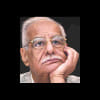Hindi spread requires patience

Whenev-er a state language wants to spread itself to the national sphere, it naturally meets with some resistance. The limits of both are delineated. One is confined to the state while the other has the entire country for its spread.
The chauvinists in states have not understood it or at least not in the manner it should be. There is no competition. One is regional and the other is national. That Hindi is the national language was decided by the constituent assembly. The parliamentary committee—representatives from the non-Hindi speaking states included—once again made it clear that Hindi was the national language and what has been left to the future was the switchover from English to Hindi.
What is happening now is that an effort is being made to reopen the language issue. Some are challenging the very idea of India and making territorial demands. This is unfortunate. Hindi was adopted to be India's language by the constituent assembly and there is a wrong impression that it was done by the majority of one. The controversy was over the adoption of numerals, not the language.
Today, official business and most other work are conducted in Hindi, much to the difficulty of non-Hindi speaking people. In fact, during the framing of the constitution in between, the issue of language was one of the most debated topics and the decision to declare a national language resulted in two prominent camps. One, the North Indians who advocated Hindi as the national language and, two, the South Indians who did not want it to be imposed upon them.
While the Hindi camp tried to push Hindi due to its "numerical superiority", the Tamil camp rejected it outright and one of the Tamil leaders even went on to mock them by pointing out that if "numerical superiority" was the criteria, then the crow had to be chosen as the national bird instead of the peacock. After several brainstorming debates, the Constituent assembly decided to finalise on Hindi with Devanagari script as the official language of the Union, along with a special clause that English would continue to remain in use for all official purposes for the next 15 years.
But within a few years, the committees set up to implement it began to face the ground realities. It came as a hard realisation that 15 years would not be a sufficient period as the process of developing Hindi to a stage where it could be used as the single national language would take more time. Even C Rajagopalachari, who had always been in favour of Hindi as the national language and had imposed Hindi in 1937 when he had formed the Government of Madras, began to air his concerns about how Hindi was yet to develop to be acceptable as the single national language.
I was present at the discussion by the parliamentary committee when Govind Ballabh Pant was the Home Minister. I was his information officer then. When he started the business, he found that the non-Hindi speaking members were up in arms and vehemently opposed to the use of the language in official business. Slowly and gradually, Pant brought around all members to reiterate that the union language, as enunciated in the constitution, would be Hindi. He left the matter of switchover to sometime in the future.
Prime Minister Jawaharlal Nehru gave an assurance to the non-Hindi speaking people that the switchover would take place only when they would be ready for it. His successor Lal Bahadur Shastri brought a bill in parliament to that effect. Parliament gave an assurance to the country that the non-Hindi speaking people would not be put to inconvenience or handicapped.
Parliament is very sensitive on the subject and does not want to take any action until the non-Hindi speaking members endorse it. But a recent move by the BJP government to promote Hindi had opened up a can of worms and scratched old scars. Social media was abuzz with debates over linguistics. While there seemed to be a general consensus among citizens that no language must be imposed upon anyone by anybody against their wishes, most states in the south, Tamil Nadu in particular, had vehemently opposed any such move.
With the spread of soft-Hindutava in the country, Hindi is coming in its wake. Prime Minister Narendra Modi feels at home with the language. So do the other members from the majority of Hindi-speaking states. That is the reason why a non-Hindi speaking state jealously guards its regional language and even challenges Hindi whenever the particular state feels that the rightful space of its own language has been taken over by the national language.
Since the country has adopted a three-language formula—English, Hindi and the regional—the Hindi-speaking states are happy because it is their regional language. Non-Hindi speaking states are also happy because they have English and fit into the dictates of the Union which is primarily conducting its business in English.
Hindi chauvinists, who showed no patience earlier, are now quiet because they find that Hindi is a compulsory subject all over the country. If not today, but tomorrow Hindi would have been learnt by the generations to come. Even the people in South India have realised that there is no go from the national language and their children are learning Hindi. Probably, the Modi government feels that it has to be patient only.
The noting on files is already in Hindi. Those who do so have the dictates of the Union in mind and give the English translation of the noting as well. It serves everybody's purpose and hence there is no reason for the government to take any extreme measures that will be looked down upon as an imposition. It would be better if things are left as they prevail today. Hindi is already there. Only a bit of patience is needed from the chauvinists. The RSS is doing that. Modi's occasional visits to the RSS headquarters at Nagpur testify to that.
Kuldip Nayar is an eminent Indian columnist.






Comments